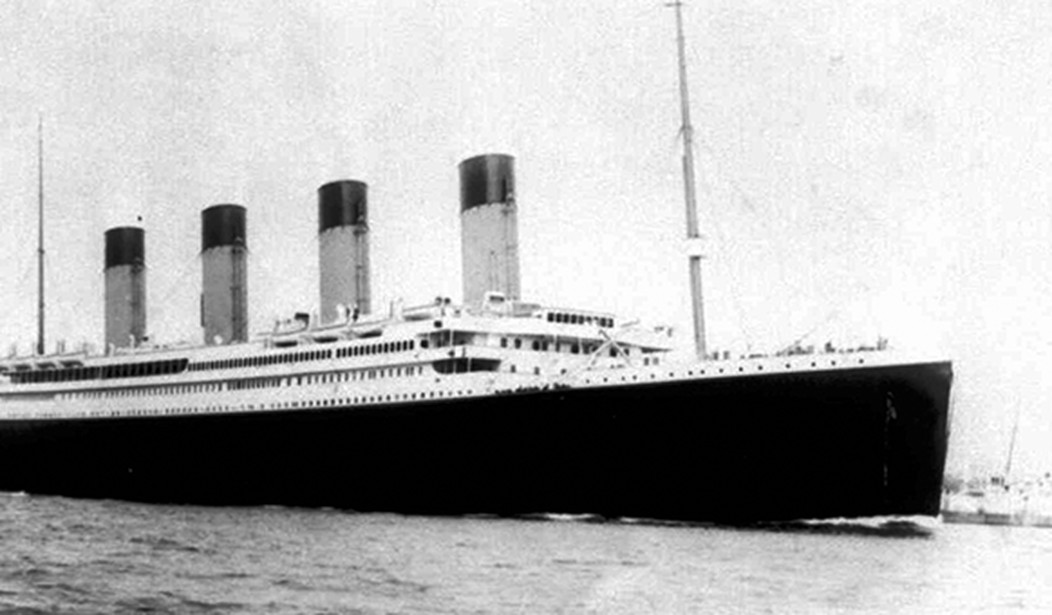One Saturday night in late September, after photoshopping Roger L. Simon into William Shatner’s Star Trek uniform (don’t try this at home kids…), I watched the Criterion Collection Blu-Ray of A Night to Remember, the great 1958 British retelling of the Titanic disaster. The one that featured a cast of grownups rather than Leo and Kate romping around amid a backdrop of a zillion extras.
After seeing James Cameron’s teen romance-meets disaster movie take on Titanic on the big screen in 1997, I remember saying to my wife as we left the theater that I wanted to see Lawrence of Arabia again for the next film we watch. Why, she asked? Because it’s all desert, no water.
I had seen plenty of YouTube clips of A Night to Remember, but this was the first time I had watched it all in sequence. While A Night to Remember is over an hour shorter than Cameron’s mammoth production, and watching it on a 55-inch TV instead of a 70-foot multiplex screen, I felt similarly wiped out afterwards. I poked around Amazon Prime on the Roku box for something that was as least like A Night to Remember as possible. I ended up watching a segment of Firing Line from 1981, in which William F. Buckley interviewed Tom Wolfe on his then-new book, From Bauhaus To Our House.
But even there — because I’m me, and this is what I do — my brain was trying to work out the connections. Mr. Guggenheim, whose daughter would found the modernist museum that bears the family name, went down with the ship along with his valet, after uttering the famous quote, “We’ve dressed up in our best and are prepared to go down like gentlemen.”
The sinking of the Titanic is universally seen as foreshadowing the horrors of World War I. (“WORLD’S LARGEST METAPHOR HITS ICE-BERG,” recalls the classic Onion headline.) That’s implicit on screen in A Night to Remember as well, of course. As L.A.-based film critic John Patterson wrote in his 2012 retrospective on the 1958 film in the leftwing London Guardian, where he notes that Eric Ambler, the film’s screenwriter was “by then an ex-Marxist,” with what sounds like a trace of tacit disappointment:
His heroes and villains, cowards and charlatans, are spread evenly across the social spectrum [in A Night to Remember], but he emphasises the numbing and mindless social deference of 1912 to a 1958 audience for whom a good many of those assumptions were still firmly in place, although their erosion was already under way. Ambler can sense a foretaste of the Somme in these events, a whole social order upended, quite literally, just as Scott’s failed Antarctic expedition, the other great British debacle of 1912, tolled the death knell for the cult of the English Gentleman Amateur.
And as Wolfe mentioned in From Bauhaus to Our House, and during his interview with Buckley, modern art and modern architecture grew out of the horrors of World War I and its aftermath. The rubble of WWI, the blood-stained trenches, and the rapid ascension of various forms of socialism all made the “Start From Zero” mindset of the Weimar Republic’s Bauhaus possible. History? The past? Tradition? It should all be tossed into the Atlantic, along with all those stuffy old toffs who went down with the ship dressed in their best.
British intellectuals at Oxford in the 1920s and ‘30s would eventually reach a similar attitude, making Britain’s entry into World War II that much more tenuous. Churchill’s confident handling of World War II was arguably the last expression of the worldview that built the British Empire; even as it was being dismantled, the Allies’ victory in 1945 kept their confidence going for another decade. British films like A Night to Remember and the equally superb 1955 World War II drama The Dam Busters were the last gasp of the mindset. (Speaking of Lawrence of Arabia, recall how shattered the late Peter O’Toole as Lawrence appeared as he left Arabia in David Lean’s 1962 film.)
The 1958 film A Night to Remember ends on two subtly contradictory notes. The final titles of the film assure us that the ship’s nightmarish demise led to new rules regarding sufficient lifeboats, new radio procedures, new ways of charting icebergs, etc. But prior to that, the last scene in the film shows Charles Lightoller, the film’s hero, played by Kenneth More, onboard the RMS Carpathia after being rescued, discussing the horrors of what he had just witnessed, and asking the various what ifs that history has wrestled with since:
LIGHTOLLER: If we’d been going slower. If we’d sighted the iceberg a minute earlier. If there had been enough lifeboats.
CARPATHIA CREWMAN: You’re not God.
LIGHTOLLER: No seaman ever thinks he is. But we were so sure. Even though it’s happened — it’s still unbelievable. I don’t think I’ll ever feel sure again — about anything.
Not too long after A Night to Remember first played British movie theaters, the Beatles were making their first sojourns into Hamburg, where local resident Astrid Kirchherr gave the lads what would be their characteristic haircuts, “a style she had seen on many German boys at her college.” Arguably, they brought back plenty of additional Weimar-esque culture as well; by the end of the following decade, like Charles Lightoller in A Night to Remember, England would never feel sure again about anything.
Update: After posting this, it occurred to me how perfectly Lightoller’s last line in A Night to Remember dovetails into Paul Johnson’s classic opening salvo in Modern Times on the 1920s and the birth of “the theory of moral relativity.”
*****
(Originally posted at Ed Driscoll.com)










Join the conversation as a VIP Member